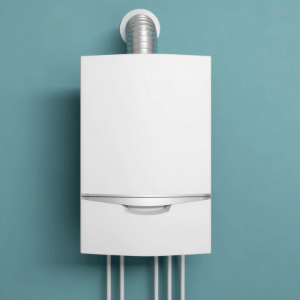Blog

Heat Pump vs Gas Boiler - What are the Differences?
Posted on 28 April 2021 in Blog
.png)
If you’re planning on installing a new heating system inside an existing or newbuild property, you may have some questions about which heating system will offer the best value and performance. Heat pumps are set to take over from gas boilers and become the new normal for how we heat our homes in the UK as we strive for a carbon net zero target by 2050.
There are considerable differences between a heat pump and gas boiler, below we’ve explained each of them so that you can make a more informed decision about which is best suited to you and your property.
Newbuild vs Retrofit
In 2025 gas and oil boilers will be banned from installation in new build houses which means heat pumps will become the new standard. If you’re building two or more new builds in the same location, shared ground arrays are a great solution.
When it comes to retrofits (existing properties), it’s likely you have a gas or oil boiler already in place and it’s just in need of an update. It would be cheaper and easier to simply switch the boiler for a new one of the same kind. However, if you’re planning a whole house upgrade (let’s say you need insulation, a new heat distribution systems, flooring etc), you may want to also consider a different heating system that can offer better efficiencies, requires less maintenance, is more environmentally friendly and has a longer lifespan.
Price and Running Costs
Gas Boilers Price: Over the decades, the installation price of gas boilers has become more competitive and simplified. You can get a new gas boiler installed in a 3-4 bedroom house, with a flue for around £1800 to £2000.
Gas Boilers Running Costs: According to a study by OVO Energy in 2019, the average annual household energy bill was £1289 (£679 for electric and £610 for gas).
Heat Pumps Price: Heat pumps have more sophisticated levels of engineering, with many elements constructed by hand. This means that the price is more premium and so we recommend budgeting around £8,500 to £15,000 for an air source heat pump and £18,000+ for a ground source (including installation).
Heat Pump Running Costs: Heat pumps are operated by electricity, for every 1kWh of heat they produce around 25% comes from electricity and the remaining 75% comes from the air or ground making them highly efficient and economical.The MasterTherm heat pumps we supply here at Thermal Earth are even compatible with time of use tariffs like Agile Octopus which offers access to the wholesale price of electricity as it changes every half hour. MasterTherm heat pumps will automatically operate at the lowest cost possible whilst also factoring in weather compensation in order to consistently deliver your preferred temperatures and heating schedules. Customers who have installed a MasterTherm heat pump and switched to Agile Octopus have noticed up to 35% savings on their monthly electricity bill.
Funding
Gas Boilers
If you have a low-income household you can apply for free or heavily subsidised boiler replacements from the government as part of the ECO Scheme. Criteria for the scheme are that you receive benefits, are a homeowner and your gas boiler is 5 years or older.
Heat Pumps
To make the pricing of heat pumps more accessible, there are several funding schemes for heat pumps which are available to private, commercial and public sectors. Homeowners can currently apply for the Renewable Heat Incentive (RHI) which offers quarterly payments for 7 years after the date of installation based on how much renewable energy your system produces. A typical 3 bedroom house with a ground source heat pump could earn as much as £29,000 over the 7 year period which in most cases would cover the cost of the system. There is also the Clean Heat Grant which is undergoing consultation at present but which could offer an upfront grant to help cover installation costs. Unlike the gas boiler grant, these two options are open to almost any homeowner or landlord and you don’t need to be on benefits to claim them.
Installation
Gas Boilers
Gas boilers are relatively simple and straightforward to install. There are many gas and heating engineers with the required qualifications and accreditations required to fit them. You can usually get a new one fitted with 7-14 working days of making the initial enquiry and it may take 1-3 days to complete the installation.
Heat Pumps
There are currently less qualified heat pump engineers in the UK than gas engineers but this number is growing. You should ensure that the engineer you select is MCS certified as they can offer support during and after your installation and by registering your installation with MCS you can qualify for the Renewable Heat Incentive. Before a heat pump is installed there is a design process which needs to be carried out which includes heat loss and heat load reports to ensure that the correct model of heat pump is used. This can add around a week to the example timings mentioned below.
Air source: Air source heat pumps are relatively quick and simple to install and take roughly the same amount of time as a boiler (1-3 days).
Ground source: Ground source heat pumps take considerably longer to install, we recommend allowing around 4 to 6 weeks. This is due to the amount of ground works required whether that’s boreholes or horizontal trenches.
Maintenance and Lifespan
Gas Boilers
It’s recommended that boilers have an annual service which costs around £80-£120. They have an average lifespan of around 15 years.
Heat Pumps
Heat pumps require very little maintenance. They last around 20-25 years and the pipes for a ground collector can last over 100 years so if you ever did need to replace the pump, it’s very unlikely that you’d need to redo the ground work too, which significantly reduces the cost. To service an air source heat pump (up to 22kW) we charge £150 including VAT and to service a ground source heat pump (up to 22kW) we charge £190 including VAT.
Efficiency
Gas Boilers
A new gas boiler will have an efficiency of around 90%, producing 1kWh for every kW of electricity used.
Heat Pumps
Heat pumps are the most efficient type of heating system available. An air source heat pump can achieve efficiencies of around 300% (3kWh of usable heat for every 1kW of electricity) and a ground or water source heat pump can achieve 400% (4kWh of heat for every 1kW of electricity). This kind of efficiency will help to reduce monthly utility bills. At Thermal Earth we offer inverter heat pumps which are highly regarded for their efficiency as they match their output to the required demand rather than cycling on and off and operating at 100%, even if the temperature needs to be raised only slightly.
Size
Gas Boilers
Gas boilers are relatively compact, in most cases they are installed in a kitchen cupboard, in an airing cupboard or in a utility room.
Heat Pumps
One of the benefits of an air source heat pump is that the unit is installed outdoors, saving you space inside your home. They can vary greatly in size but the smallest MasterTherm BoxAir model measures W 1300mm X H 885cm X D 526 making it quite compact. Ground source heat pumps are also available in compact sizes, some of which are not much larger than a gas boiler. The smallest model provided by MasterTherm is an AQ17i which measures W 530mm X H 815mm X D 830mm which is small enough to fit in an airing cupboard or space underneath the stairs. The largest MasterTherm unit is roughly around the same size as a standing fridge freezer and it's not this size because it has a higher output, it's because it has an integrated hot water tank, so this actually helps to save on space and reduces installation time and cost.
User Experience
Gas Boilers
Using a gas boiler is quite simple and easy. New gas boilers have a control panel on the unit itself, a thermostat on a wall placed in a convenient position and access to control the heating via a smartphone app. When it comes to additional features and functions, a gas boiler doesn’t really provide any additional value for money or opportunity.
Heat Pumps
Heat pumps offer the same kind of controls as a gas boiler, a control panel on the unit, thermostat on the wall and access to monitoring and setting heating schedules through a smartphone app. However they can offer you much more than a boiler can in terms of improving your home. As mentioned previously they can integrate with time of use tariffs and operate automatically so that they run as efficiently as cost effectively as possible. MasterTherm heat pumps are also compatible with Solar Thermal technology if you plan to enhance your home with additional renewable energy features and can also provide both passive and active cooling technology. By combining your heating and cooling within one system, it can help to save time and money compared to installing two separate systems.
Carbon Foot Print
For the examples below, we’ve assumed that each system will be using mains grid electricity to operate. It’s worth noting that there are energy providers that now provide 100% renewable electricity tariffs which can reduce your household carbon even further – when used with a heat pump your system would be carbon free.
Gas Boilers
A gas boiler will produce around 215g of CO2 per kWh of delivered heat.
Heat Pumps
Heat pumps themselves are clean, combustion free and produce zero carbon. However they require electricity to operate which is where the carbon is generated. Ground source heat pumps will produce around 11g of CO2 per kWh of delivered heat. That’s 181% less than a gas boiler.
(Source GSHPA.org)
Conclusion
If you’re currently developing a new build or giving an existing home a full renovation, then we recommend heading down the heat pump route. It makes sense to install a more efficient, low carbon system which can offer you increased functionality. You can also take advantage of the government schemes mentioned above to help finance the system and get a return on your investment with RHI. If you’re unsure which heat pump to choose, we’ve also created an air source vs ground source comparison to provide guidance on which may be best for your project.
If you'd like any advice or information about installating a heat pump, we're always happy to help. Call us on 01269 833 100 or Submit an Enquiry
 Facebook
Facebook LinkedIn
LinkedIn Twitter
Twitter













